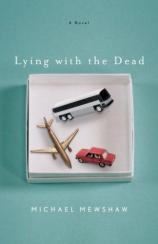Reading Group Guide
Discussion Questions
Lying with the Dead

1. In speaking of the way he compartmentalizes his thoughts and memories, Maury says, “Only two drawers I’ve never been able to open. The first has to be the day Dad died. The second I don’t have any idea what it holds and I’m afraid to find out.” What do you suppose is in that second drawer inside Maury’s head?
2. Candy states, “Where another person might find strength in a bottle, I naturally depended on God.” How does Candy’s faith see her through the many troubles she faces in life?
3. When Candy brings her mother Communion she recites the liturgy for the Communion of the Sick where Christ declares, “If anyone eats this bread he shall live forever.” Why does Candy feel compelled to symbolically bring eternal life to a mother who never loved her and whom she has wished dead?
4. In discussing the BBC adaptation of the Oresteia, Mal states, “We want the characters to have the dramatic grandeur of archetypes, and yet at the same time human identities.” In what way is this also an apt description of the Mitchell siblings and their mother? Quinn refers to playing Agamemnon and Orestes as “the role of a lifetime, the one I was born to play.” What does he mean by this? How can this description also be applied to Quinn’s role at home in Maryland?
5. Based on Maury’s recollections, how would you characterize his relationship with Cole? What is your interpretation of Cole’s illness? Do you think Maury understands the nature and implications of Cole’s illness?
6. How does Maury’s mother justify letting her son take the fall for a crime she knows he did not commit? How does Maury reconcile the constructed story of what happened that night with reality? Does Maury believe he is guilty on some level? Discuss whether Quinn or Candy ever suspected that Maury was not the one who killed their father.
7. Quinn’s life seems to be an exercise in performance. Consider his initial approach to writing his memoir and his interactions with those close to him --- Monsignor Dade, his agent, Dr. Rokoko, Tamzin, his mother and siblings --- and discuss ways in which Quinn appears to be acting out a role rather than living honestly and authentically. How does he change by the end of the novel?
8. Quinn recalls the French playwright Jean Genet, who once said, “If everybody were savagely punished in youth, there’d be far more beauty and poetry in the world.” Does this theory hold true in the adult lives of the three Mitchell siblings after their tormented childhood? Do you envision a life of greater beauty for Quinn, Maury, and Candy after their mother’s death? Why or why not?
9. As Quinn confronts the revelation that he has a different biological father than Candy and Maury, he describes living in the shadow cast by his presumed father’s absence and then having to confront an even murkier absence when he learns he had a stranger for a father all along. How much of Quinn’s identity was wrapped up in his role as a biological member of the Mitchell family? Does it help him to know the truth at this point in his life? Why does his mother share this information with him?
10. At one point or another, Mom asks all three of her children to kill her. How do you suppose she justifies burdening her children with such a request? Why is it Quinn who ultimately obliges rather than Candy or Maury? In what ways is her death both a burden and a relief to Quinn? To Maury? To Candy?
11. What is the significance of smothering in this novel? Who is smothered by whom, in both a figurative and a literal sense?
12. Discuss the various possible meanings for the book’s title.
Lying with the Dead
- Publication Date: October 6, 2009
- Paperback: 288 pages
- Publisher: Other Press
- ISBN-10: 1590513185
- ISBN-13: 9781590513187







